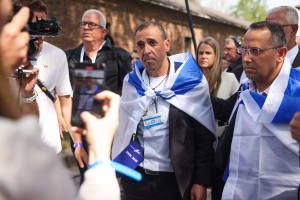Spain joins EU initiative to recognize Palestinian state 'in the name of Middle East peace'
Israel condemns decision calling it a 'prize for terrorism'

Spain announced last week that it is in agreement with Ireland, Malta and Slovenia to take the next steps toward recognizing a Palestinian state “in the name of Middle East peace.”
Following a meeting of the European Council in Brussels, Belgium last Friday, Spanish Prime Minister Pedro Sánchez told reporters that the agreement was made after convening with Irish, Maltese and Slovenian leaders in a side meeting at the UN Security Council (UNSC) gathering. Sanchez said he expects to recognize the Palestinian state during his current 4-year legislature that began last year.
“We discussed together our readiness to recognize Palestine and said that we would do so when it can make a positive contribution and the circumstances are right,” the four countries wrote in a joint statement after the EU summit.
When asked by reporters what circumstances this would entail and what conditions had to be met, Sánchez said: “We have to decide when to do it, when we contribute to a solution and therefore, it is a matter of political assessment.”
The move to recognize a Palestinian state came amid calls by the European Union for an “immediate humanitarian pause leading to a sustainable ceasefire” in the war in Gaza. The EU has also called for international pressure on Israel not to launch a major ground offensive in Gaza’s southernmost city of Rafah.
“Let us never forget that there are more than 130 countries in the world that have already recognized the Palestinian state and therefore, we are talking about the West fundamentally and singularly about the European Union, about many countries in the European Union,” Sánchez added.
Nine out of 27 EU member states currently recognize the Palestinian right to a state.
Israel condemned Spain’s announcement on Monday, saying the decision amounted to a “prize for terrorism” that negatively impacts ongoing negotiation efforts.
“Recognition of a Palestinian state following the October 7 massacre sends a message to Hamas and the other Palestinian terrorist organizations that murderous terror attacks on Israelis will be reciprocated with political gestures to the Palestinians,” Israeli Foreign Ministry spokesperson Lior Haiat wrote on 𝕏.
“A resolution of the conflict will only be possible through direct negotiations between the parties. Any engagement in the recognition of a Palestinian state only distances reaching a resolution and increases regional instability.”
Gaza has been under the rule of the Hamas Islamist terror group since 2007. After Hamas terrorists attacked Israel on Oct. 7, brutally murdering 1,200 civilians, kidnapping about 250 hostages and triggering a devastating war in the region, violence erupted in the West Bank, known as biblical Judea and Samaria, where Israel has established Jewish settlements.
Since the Oct. 7 attack, the EU has been divided in its response to Israel’s military operation in Gaza but has revived efforts towards a Middle East peace process, initiating a plan for a “credible, comprehensive solution” to the Israeli-Palestinian conflict.
“We all agreed that the only way to achieve lasting peace and stability in the region is through the implementation of a two-state solution, with Israeli and Palestinian states living side-by-side, in peace and security,” the four EU leaders wrote in their statement.
Malta recognized Palestine’s right to a state in 1988 but never fully carried out the decision. The Eastern European states of Bulgaria, the Czech Republic, Romania and Slovakia were also recognized at the time.
In February, amid reports that the United States and numerous Arab partners were preparing a plan for a comprehensive peace deal with a specific timeline, Netanyahu declared Israel’s opposition to any “unilateral” recognition of a Palestinian state and brought the vote to the Knesset, which unanimously approved the measure.
According to Israeli officials, any permanent peace agreement with Palestinians must be reached through direct negotiations between the sides and not by international dictates.
Netanyahu has spoken out against the creation of a Palestinian state and others have also pushed back against pressure from Washington and international leaders suggesting that current negotiations regarding the conflict in Gaza should be used to springboard efforts to reach a two-state solution.
Some believe the conflict underscores the urgency for a peace agreement, however, Israeli leaders argue the attack highlighted the existential threat posed by an autonomous Palestinian government against the Jewish state. In addition, polls indicate strong support among Palestinians for the atrocities carried out on Oct. 7, which has left Israel with little interest in pursuing peace initiatives.

The All Israel News Staff is a team of journalists in Israel.














